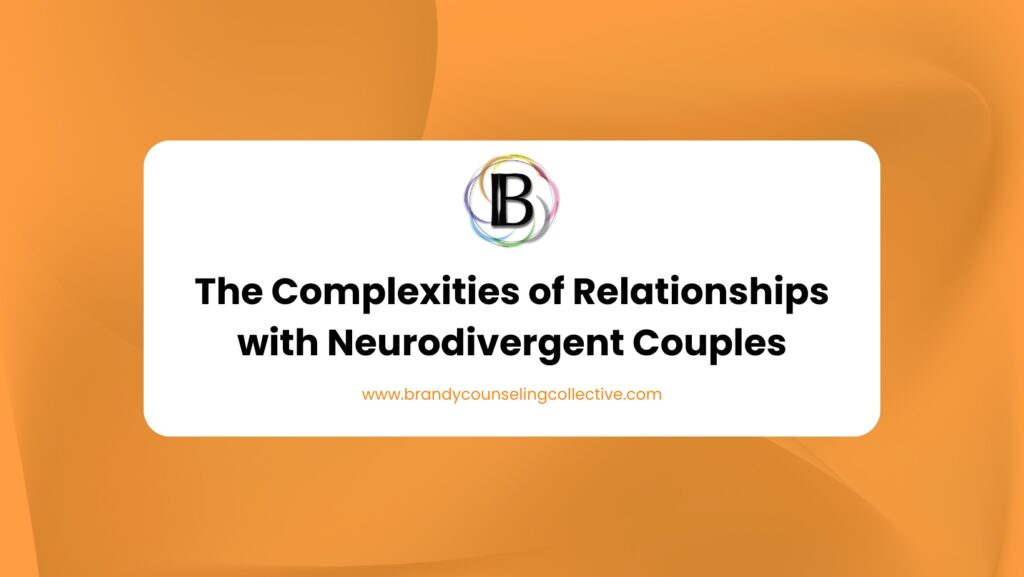Relationships, in general, are intricate and require effort, understanding, and mutual respect. When one or both partners in a relationship are neurodivergent, these complexities can become even more pronounced. Neurodivergent couples—where one or both partners have conditions such as Autism Spectrum Disorder (ASD), Attention Deficit Hyperactivity Disorder (ADHD), or other neurological differences—often navigate unique challenges and dynamics. Understanding these complexities is crucial for fostering healthy and fulfilling neurodiverse relationships.
Understanding Neurodivergence
Neurodivergence refers to variations in the human brain regarding sociability, learning, attention, mood, and other mental functions. Neurodivergent conditions include ASD, ADHD, dyslexia, and more. Each condition comes with its own set of characteristics that can influence how individuals interact with the world and their partners.
Communication Differences
One of the most significant challenges in neurodiverse relationships is communication. Neurodivergent individuals often have distinct communication styles that can differ greatly from neurotypical norms.
Autism Spectrum Disorder (ASD)
- Literal Understanding: Individuals with ASD may interpret language literally. Sarcasm, idioms, and indirect language can be confusing or misunderstood.
- Social Cues: Recognizing and interpreting social cues, such as body language and facial expressions, can be challenging. This can lead to miscommunications or perceptions of insensitivity.
- Direct Communication: People with ASD often prefer clear, direct communication. They may not engage in small talk or may find it difficult to express emotions verbally.
Attention Deficit Hyperactivity Disorder (ADHD)
- Impulsivity: Individuals with ADHD might speak or act impulsively, which can sometimes be perceived as thoughtless or interruptive.
- Distractibility: Maintaining focus during conversations can be challenging, leading to misunderstandings or the appearance of inattentiveness.
- Hyperfocus: On the flip side, hyperfocus on a particular topic can lead to conversations that are heavily one-sided, which can affect relational balance.
Emotional Regulation
Emotional regulation can be another area of complexity in neurodivergent relationships. Both partners may have different thresholds for emotional stimuli and varied ways of processing emotions.
- Emotional Sensitivity: Neurodivergent individuals might experience emotions more intensely, leading to heightened responses to stress, joy, or frustration.
- Alexithymia: Some individuals with ASD may have difficulty identifying and describing their own emotions, which can complicate emotional exchanges with partners.
- Mood Swings: Those with ADHD might experience mood swings, making emotional stability a challenge.
Sensory Sensitivities
Sensory processing issues are common in neurodivergent individuals and can affect relationship dynamics significantly.
- Overstimulation: Sensory overload from environments that are too loud, bright, or chaotic can lead to stress and withdrawal.
- Sensory Seeking: Conversely, some individuals may seek out sensory experiences that others find overwhelming or distracting.
Managing Daily Life
Daily life management can be a source of stress and conflict in any relationship, but it can be particularly challenging for neurodiverse couples.
- Routine and Structure: Individuals with ASD often thrive on routine and predictability. Unexpected changes can be distressing and disruptive.
- Time Management: ADHD can make time management and organization difficult. Forgetting appointments, being late, or struggling with task completion can cause frustration.
- Division of Labor: Balancing responsibilities in a way that accommodates each partner’s strengths and weaknesses requires clear communication and flexibility.
Mutual Understanding and Support
For neurodivergent couples, fostering mutual understanding and support is essential.
Education and Awareness
- Self-Education: Partners need to educate themselves about each other’s neurodivergent conditions. Understanding the characteristics and challenges associated with ASD, ADHD, or other conditions can foster empathy and patience.
- Shared Learning: Couples can benefit from learning together about strategies and tools that can improve their relationship dynamics. This might include attending workshops, reading books, or engaging in therapy.
Professional Support
- Therapy: Couples therapy, particularly with a therapist who understands neurodivergence, can provide valuable tools for communication and conflict resolution.
- Individual Support: Personal therapy or coaching can help each partner manage their own challenges and bring their best selves to the relationship.
Communication Strategies
- Clear and Direct Communication: Being explicit about needs, expectations, and feelings can reduce misunderstandings. Effective communication is key in ensuring both partners feel heard and understood.
- Scheduled Check-Ins: Regularly scheduled times to discuss relationship issues can provide a structured environment for addressing concerns.
- Written Communication: Sometimes writing things down, whether it’s an important point or a list of tasks, can help ensure clarity and mutual understanding.
Celebrating Strengths
Neurodivergent individuals often bring unique strengths to their relationships that should be recognized and celebrated.
- Attention to Detail: Individuals with ASD may have an exceptional eye for detail, which can be an asset in many situations.
- Creativity and Problem-Solving: Those with ADHD often think outside the box and come up with innovative solutions to problems.
- Loyalty and Honesty: Many neurodivergent individuals are known for their loyalty and honesty, traits that are foundational for strong relationships.
Building a Supportive Community
Having a supportive community can make a significant difference in the lives of neurodivergent couples.
- Support Groups: Joining support groups for neurodivergent individuals or couples can provide a sense of community and shared understanding.
- Online Communities: Online forums and social media groups can offer advice, share experiences, and provide emotional support.
Flexibility and Adaptation
Flexibility and adaptation are key components in maintaining a healthy relationship.
- Adapt to Each Other’s Needs: Both partners should be willing to adapt and accommodate each other’s unique needs and preferences.
- Flexibility in Approaches: Understanding that there is no one-size-fits-all solution and being open to trying different strategies can help in finding what works best for the relationship.
Neurodiverse relationships are undoubtedly complex, but with understanding, effort, and the right strategies, they can be deeply rewarding. Embracing the uniqueness of each partner, fostering open communication, and seeking support when needed can help neurodivergent couples navigate their challenges and build strong, fulfilling relationships.
By recognizing and celebrating each other’s strengths and working collaboratively to manage difficulties, neurodivergent couples can create a loving and supportive partnership that thrives amidst diversity. With a willingness to learn, communicate openly and honestly, and adapt as needed, partners can feel safe and valued, paving the way for healthy neurodiverse relationships.
Navigate the Complexities of Neurodiverse Relationships with Brandy Counseling Collective
Are you or your partner navigating the unique challenges of a neurodivergent relationship? Brandy Counseling Collective offers specialized support and guidance to help neurodiverse couples build strong, fulfilling partnerships. Our expert team provides personalized strategies to improve communication, manage emotional regulation, and create a supportive environment where both partners feel safe and understood.
Take the first step towards a healthier and more harmonious relationship. Contact Brandy Counseling Collective today to learn more and schedule a consultation.


